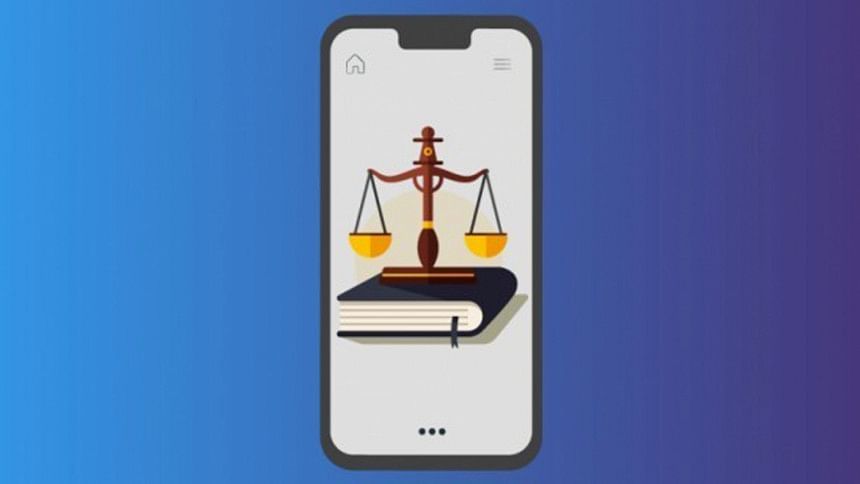Anticipatory bail: gateway to justice and surrender before law

Anticipatory bail, one of the reliefs within the auspices of the criminal justice system, had been more popular in our country before its scope was narrowed down by the Appellate Division of the Supreme Court in Durnity Daman Commission v Khandaker Mosharraf Hossain (2014). Anticipatory bail, as a topic, made its appearance both in print and electronic media on several occasions. Recently, it has made headlines once again when Ron Haque Sikder, Managing Director of Sikder Group, and his brother Dipu Haque Sikder filed an application for anticipatory bail before the High Court Division in a case filed on charges of torturing and threatening to shoot two top officials of Exim Bank Limited over an issue of loan sanction. The application was filed before one of the virtual benches of the High Court Division.
In this backdrop, it was time and again asked as to how the accused petitioners could seek bail while staying outside Bangladesh. The learned Senior Advocate Azmamul Hossain QC appearing on behalf of the accused petitioners explained the legal provisions in favor of giving a scope to the accused petitioners, if not by granting bail, at least by giving them the chance to surrender on account of appropriate directions as the Court deems fit and proper. On the other hand, the Attorney General office opposed the bail prayer on the ground that law did not support it.
Referring to Sections 3 and 4 of the Use of Information and Communications Technology in Court Ordinance, 2020, the petitioner's lawyer argued that appearing before the Court virtually should be deemed to be appearing in person, and it is not mentioned whether such appearance should be from within the territory (or otherwise) of Bangladesh. A lawyer's as well his client's appearance virtually should be treated as true appearance before the Court and such appearance could be, as per the petitioner's submission, made from anywhere of the world. Notwithstanding anything to its contrary, the Ordinance allows the Court to conduct trial, inquiry, hear appeal or any application, take evidence, hear arguments, pass any order or judgment and conduct court proceedings through audio, video or any other electronic media in all civil or criminal cases subject to practice direction.
In addition, regarding the issue of personal appearance required before the Court for anticipatory bail, the petitioner's lawyer referred to KM Jahangir Alam v State (1998) wherein the High Court Division observed that "lastly we are to settle the question as to whether a person seeking anticipatory bail is required to appear before the Court of Sessions or the High Court Division. Section 499 like section 496 or 497 does not require a person to place himself in custodian legis, to be dealt with in accordance with law. Therefore, if he is allowed anticipatory bail then upon furnishing bond, he will subject himself really to one form of custody. If the prayer is rejected or ad interim bail is allowed, but is subsequently cancelled, then the matter ends there and does not entail the consequence that he has to be given into the police or jail custody. His position cannot be worse than before the refusal of his prayer for/or cancellation of anticipatory bail."
In response, the Attorney office vehemently opposed the application arguing on several points, mainly, on the grounds that it was unprecedented, would open a floodgate, and that the Ordinance did not imply surrendering before the Court while being outside the country, it did not cover/foresee anticipatory bail; sections 497-498 of the Penal Code mandate the accused to be present before Court in person for praying for bail, it was discriminatory and it would give negative impression to the people about Court as several headlines were already made by then.
It is pertinent to refer to the already settled position of our Apex Court on this issue. In the aforementioned case, Durnity Daman Commission v Khandaker Mosharraf Hossain the Appellate Division held that "anticipatory bail is obviously an extraordinary measure; in that ordinarily an accused is required to pray bail from the lowest ladder of the Criminal Court with jurisdiction. In fact, that is what the relevant legal scheme contemplates. When an accused invokes section 498 to use the High Court Division as the first forum to seek bail, he jumps all the Criminal Courts below. While there is nothing to step the High Court Division from enlarging an accused on anticipatory bail, the proposition that discretion to enlarge accused persons on anticipatory bail must be exercised sparingly in exceptionally deserving cases, is supported by unbroken chain of authorities of high preponderance, not only because by assuming this power, the High Court Division in a sense [destabilises] the normal pattern and usurp the discretion meant to be set apart for the lower courts, but also because it is the courts at the lowest stratum that can deal with the matter with greater precision as it would normally have the relevant papers before it. Converting the High Court Division into a Magistrate's Court is least desired." In this case, the Court also gave seven essentials to be considered for granting anticipatory bail.
Amidst these critical legal arguments and almost settled legal position, several important issues, in my understanding, remain outstanding. Anticipatory bail is not a regular bail which may continue till disposal of the case unless the privilege of bail is otherwise misused by the accused. Neither does it give any assurance that the accused will be enlarged on bail by the subordinate Court nor can the accused avoid surrendering after expiry of the period of anticipatory bail. It is considered as an 'extraordinary relief' in 'extraordinary circumstances'. By anticipatory bail or direction to surrender, the accused is not ultimately given any extraordinary relief, rather it gives a fair chance to the accused to surrender him/herself before the Court. It is one way of letting one subjecting oneself to the process of court.
Additionally, anticipatory bail is given for a temporary period of time. Direction to surrender is also given for a temporary period. Within this temporary period, or after a fixed period of time, the accused is bound to surrender before the Court. It ultimately brings the accused within the scope of law. For instance: if Ron Sikder and his brother were given direction to surrender before the Court, it would not only make it easy for bringing them back to the country but also would help the law follow its due course. Whether a relief that upholds the rule of law by extending its hands should be made inaccessible by qualifying the same as an extraordinary relief, is yet to be settled. Equally perplexing is the question if the same should be applied for tackling extraordinary situation and for bringing the accused under the purview of law. It can be seen as a reasonable gateway to justice in extraordinary situation for the apparently untouchable offenders and can also be a way/means for a person to access and surrender before law which happens to be his/her fundamental right. There is a maxim 'boni judicio est ampliare jurisdictionem' (it is the duty of a good judge to extend jurisdiction). Re-thinking is the key.
The writer is an advocate, Supreme Court of Bangladesh.

 For all latest news, follow The Daily Star's Google News channel.
For all latest news, follow The Daily Star's Google News channel. 



Comments